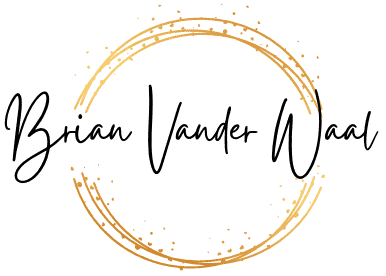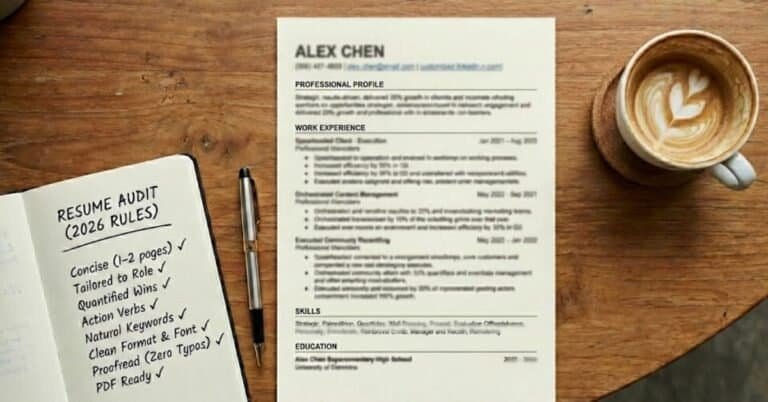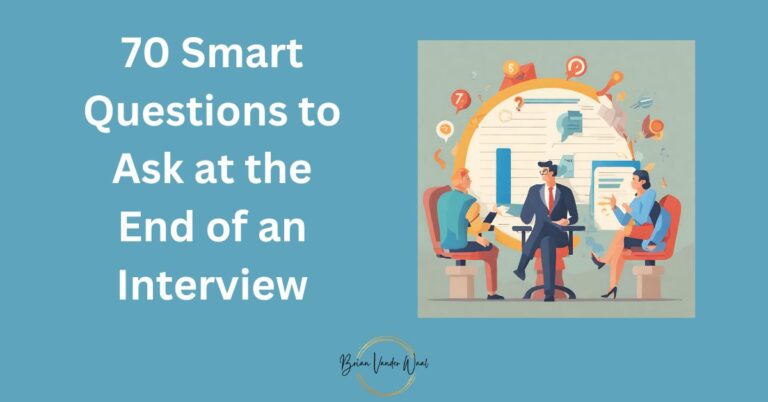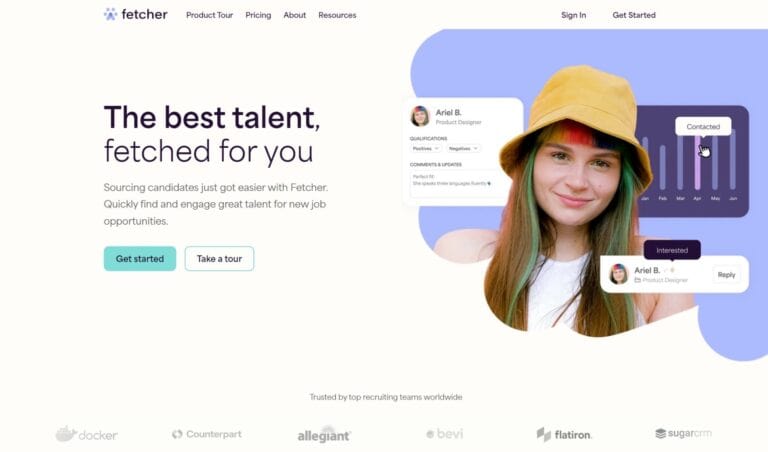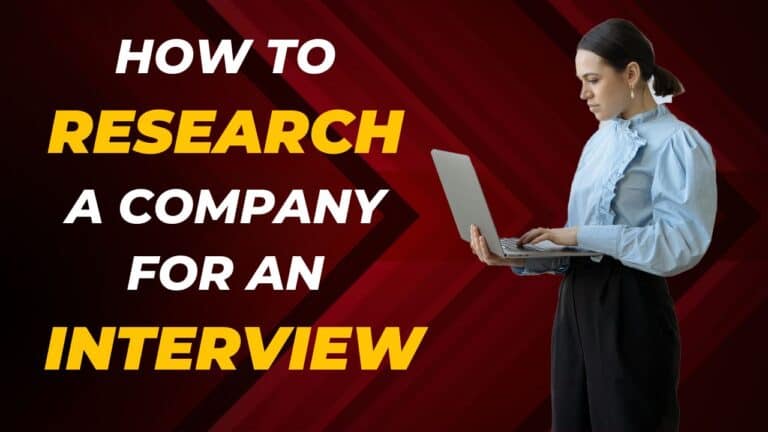Heart beating . . . sweating . . . panic . . . mind block . . . Interviews can be one of the most nerve-wracking events in life, but they do not have to be. With the right preparation and techniques, interviews can be fun (or at least less stressful), and anyone can succeed. 161 Job Interview Tips 2026: How to Excel in An Interview provides the ultimate guide on how to make a positive impression and secure the job you are seeking. If you implement the advice in this guide, I guarantee you will find more success in your next job interview than you ever thought possible. Read these interview tips to help you land your dream job!
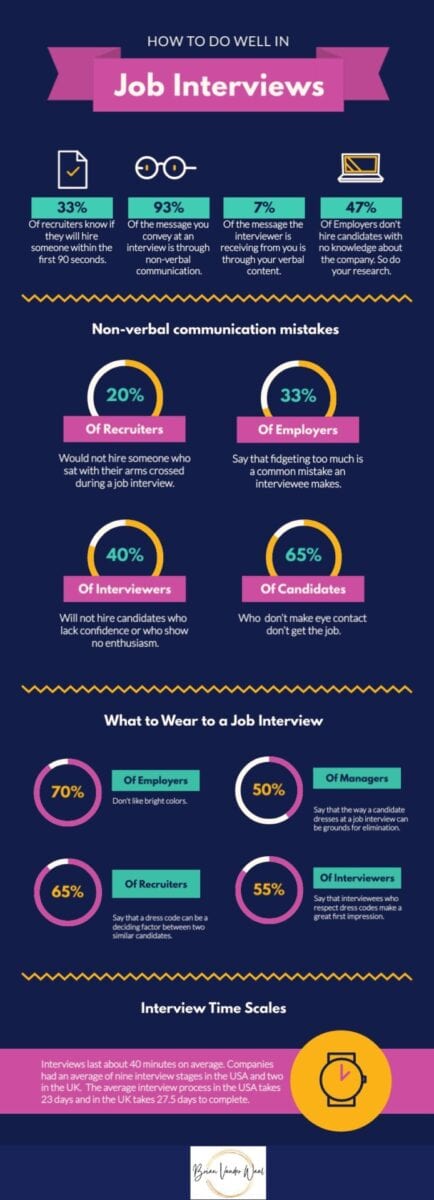
Who am I, and why should you trust my interview tips?
My name is Brian Vander Waal, and I have invested more than 19 years in the employment and careers sector. As a Career Coach, I have supported thousands of clients with interview prep, which has helped them land their dream jobs. Due to my expertise and experience, I know what it takes to help people succeed in interviews.
Interview Tips: How To Prepare for an Interview
1. Practice as much as you can. It is a good idea to practice answering questions aloud because, at first, you might stumble over your words, but your answers will get more precise and smoother over time. Having the ideas in your mind often is not enough because you do not get the opportunity to practice putting these thoughts into articulate sentences. Practice helps you to improve your interview skills.
2. Ask a family member or friend to help you prepare for your interview. In particular, ask them to carry out a mock interview with you. Conducting a mock interview will allow you to practice reciting answers, fix mistakes, and discover questions you did not think about. It is better to make a mistake with a friend or family than in an interview. Overall, mock interviews will help you feel confident as you improve your interview techniques.
3. Interview preparation will help alleviate some of the stress in job interviews and help prevent mind-block. The more you prepare, the more comfortable and confident you will be on the interview day. As a result, you will be more successful in the interview and have a better chance of landing the job.
4. Prepare five key selling points you can use in the interview to demonstrate that you are the best candidate for the position. Also, prepare an example that supports each selling point.
5. Use AI Tools such as an AI Interview Coach or AI Coach for Interview Prep to Improve Your Interview Skills and Interview Techniques.
Review the Job Description and Predict Questions the Interviewer Will Ask
6. Review the job description. Familiarize yourself extensively with the job description and person specification.
7. Expect that you will be asked questions linked to the job description. Anticipate interview questions and prepare answers based on the knowledge, skills, experience, and duties required for the role.
8. List the job duties stated on the job posting and match them to your experience. Think of examples of how you meet the requirements of the job description. Prepare real, specific, and solid examples you can use to highlight your skills.
9. When answering interview questions, ensure you communicate your successes and results within your examples, as this is one of the best ways to prove you are suitable for the job.
Prepare Answers to Common Interview Questions
10. Know how to answer common interview questions often asked at an interview. Rehearse your answers to these questions so that the answers become second nature to you. While you can’t predict every question, you can prepare for common ones like “Tell me about yourself,” “What are your strengths and weaknesses?” or “Where do you see yourself in five years?”.
11. If the interviewing manager says, “Tell me about yourself,” this could be an opportunity to discuss your selling points rather than just provide personal information about yourself.
12. Be prepared to answer questions related to what you wrote on your resume, CV, or application form. If someone has helped you write these documents, such as a CV Writing Service or friend, make sure you know and understand what is on there.
13. Be prepared to answer questions related to your experience and accomplishments. Match your experience and career achievements to what the company is looking for.
14. Make a match between your expertise and the company’s requirements, as this technique will help you to sell yourself to the hiring manager.
15. Be prepared to tell the interview panel why you want the job. You should be ready to discuss what interests you about the role, how your values match the company’s values, what you hope to contribute and achieve, and how your skills fit well within the role and the organization’s needs! You need to convince the panel that you want the job.
16. Prepare questions to ask the interviewers at the interview. Ask insightful questions demonstrating:
- Your interest in the role and the organization,
- You are serious about the role,
- You are curious about what it would be like to work there.
Good questions showcase your research and your knowledge of the company and industry. This is your chance to determine if the company fits you well.
17. Determine where you do not meet the job criteria and take the opportunity to prepare an answer for how you will offset this.
18. Consider any potential concerns the recruiter may have that cause them not to want to hire you. Then, prepare an answer that may help to ease this concern. Anticipation will ensure you are not quickly written off, especially in a competitive interview.
How to Research a Company For an Interview
19. You must research the company or organization you are interviewing with. This will enable you to tailor your responses and show genuine interest. Your interview answers should reflect the research you have done.
20. Ensure you know the mission, vision, values, aims, objectives, and direction, of the company or organization you are interviewing. Also, make sure you understand their culture and recent achievements.
21. Know what the company does, the products they sell, the services they provide, and who they serve.
22. Become aware of what kind of people the employer wants, how your experience and skills match the people they want, and how your values complement the company’s values.
23. Be aware of what learning, development, progression, and promotion routes there are at the company and be able to communicate your desired career pathway for the next 5-10 years.
24. Make sure you know, understand, and can answer questions related to the industry or sector the employer is in. Be aware of significant developments and trends in the field/sector of the organization you are applying to.
25. Link what you have learned about the company and industry to your experience when answering questions.
26. Utilize the internet (including the company website, Glassdoor, and other websites referencing the company), professional magazines, news sources, press releases, social media sites and posts (LinkedIn, Twitter, Facebook), and other sources to research the company.
27. Contact a friend, associate, family member, or anyone you know working at the company to learn more about the company (if possible).
28. Prepare for the interview question, “What do you know about this company?”
29. Knowing who to ask for when you arrive at the interview is essential. Know the recruiting manager’s name and position within the company or job title. Also, ensure you know the spelling of their name and especially how to pronounce their name.
30. Knowing the name of the recruiting manager will allow you to address them by name during the interview. Most interviewers will appreciate the personal touch.
31. If you do not know the name and job title of the hiring manager or how to pronounce their name, you can call and ask before the interview.
32. Building rapport with the person interviewing you can increase your chances of getting hired. People hire candidates they like and who fit the company culture well.

Arrange What You Need For Your Interview Before Interview Day
33. Carefully read the interview invite email, taking note of all the details. One of the biggest mistakes people make is not reading the email carefully; thus, they miss vital details or are not ready for an aspect of the interview. Further, asking a question about something stated clearly in the email will leave a poor impression, as it will reveal that you did not read the email carefully.
34. If you receive an interview invite via phone, listen carefully to the information shared with you. Take notes so that you remember all essential details.
35. Prepare your interview outfit well in advance so that if anything goes wrong, you have time to rectify it. Check well in advance whether there is an item of clothing you need to wash, iron, or even buy.
36. Arrange a portfolio that contains certifications, qualifications, certificates, diplomas, degrees, examples of your work, evidence of work achievements, and anything else that will highlight you as a candidate.
37. Prepare and bring to the interview your interview invitation, your application form, a few copies of your resume / CV, your references, your photo ID (e.g. passport or driving license), a pen and notepad, your portfolio, copies of letter(s) of recommendation, and transcripts.
38. Get a good night’s sleep before the interview so that you are well-rested, alert, and have a clear mind. Getting enough sleep is usually more important than spending extra time preparing late at night. If you plan for the interview well in advance, you will not have to cram late the night before.
Dressing Appropriately Will Help You Excel in an Interview
39. Make sure you dress smart and professionally. Also, ensure you look groomed and neat. Small details do matter. Make sure your clothes are not damaged, dirty, or stained in any way. Shine your shoes, ensure your nails are clean, and your tie is straight (if you are wearing one).
40. Your attire should match the company’s culture or the nature of the position you’re applying for. You can email or call the company to learn their dress code before the interview. Alternatively, you can research this on the internet. When in doubt, it’s better to err on the side of formality, than dressing too casually.
41. Do not wear strong perfume or cologne, which can be distracting and off-putting. Some people also have an adverse physical reaction to perfume or cologne, such as getting headaches.
42. You feel how you look, so when you look good, you feel good. As a result, you will go into your interview with more confidence. This applies to video and face-to-face interviews. So, dress for success.
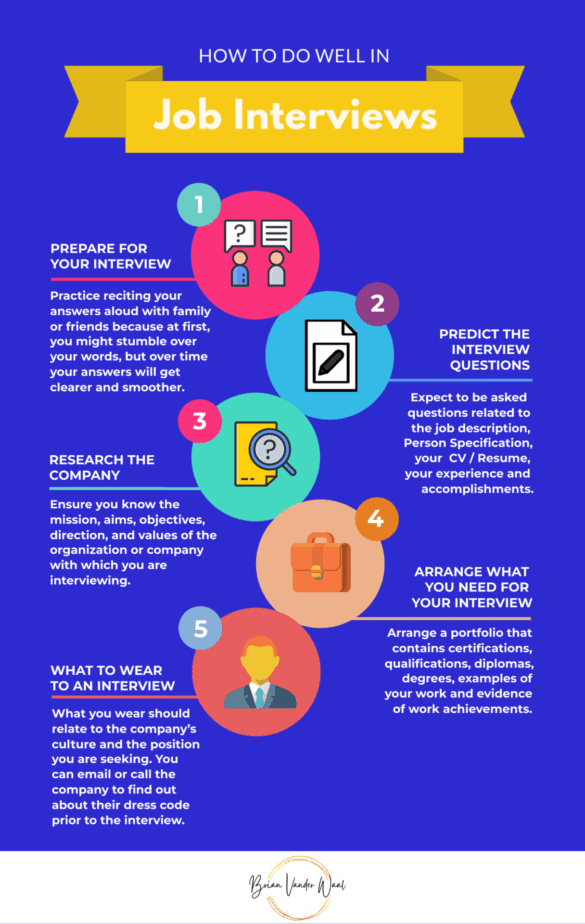
Interview Tips: Plan to arrive early for your interview
43. Prepare the route plan for the interview well in advance.
44. Arrive at the interview location 10-15 minutes before the interview to ensure you are on time and set a positive impression on the interviewer. It respects the interviewing manager’s time and demonstrates your time management skills.
45. Give yourself enough time to visit the restroom/bathroom/WC to check your outfit and calm your nerves before the interview begins.
46. Plan to arrive in the area where your interview will be 30-60 minutes early in case of unexpected traffic or public transport delays. You can go to a coffee shop and relax or do the final preparation if you are early.
47. Travel to the interview location a day or two before so you know exactly where you are going and how long it will take to get there.
Interview Tips: The Dos and Don’ts of Interviews
48. DO silence or switch off your phone before you enter the interview venue. If your phone starts ringing or beeping during the interview, it is embarrassing and distracting. It does not set a good impression. This also applies to video interviews.
49. Do accept water if an interviewer offers it to you. If you need time to think of an answer to a question, one trick is to sip your drink, allowing you to buy some time. Also, if your throat gets dry or you feel a tickle, you can have a drink.
50. Do use relaxation techniques, breathing techniques, or mindfulness to help you stay as calm as possible. You must use some of these techniques (i.e., mindfulness) before the interview, as you can’t do it during the interview.
51. Do be well-mannered and respectful to any staff you meet before or after the interview, inside and outside the building, no matter their job role. This includes the cleaner, security personnel, receptionists, people you meet in the parking area, and anyone else you encounter. Some companies speak to staff members you could have encountered in the building and on the property and ask how you behaved and communicated with them. Being rude or disrespectful could be a dealbreaker.
52. Do make a great first impression. Some studies say recruiters make up their minds about candidates in the first 90 seconds of the interview. Others say they decide in the first five minutes of the interview. Either way, most interviewers will make up their minds early in the interview and then will spend the rest of the interview looking for things to confirm that decision. So, bring your ‘A game’ from the beginning of the interview.
53. Do follow the interviewer’s lead regarding whether to shake hands before the interview. In a post-COVID world or due to cultural reasons, the interviewing manager may not shake your hand. However, if you shake hands, give a firm handshake, demonstrating confidence. Ensure your handshake is not floppy, but do not give a hand-crushing handshake.
54. Do show enthusiasm in how you speak throughout the interview, as this will demonstrate that you are genuinely interested in the role.
55. Do show energy and liveliness throughout the interview, rather than appearing dull and sluggish, because employers want to hire people who they feel have a lot of drive and energy and will be go-getters.
56. Don’t, under any circumstance, take out your phone during the interview. Put away your phone in your pocket or a bag.
57. Don’t answer your phone during an interview.
58. Don’t check your texts, your messages, or anything else on your phone during the interview. It is insulting to look at your phone, demonstrating that you are not serious about the role.
59. Don’t bring coffee, soda/pop/fizzy drink, or any other drink into the interview, as it is incredibly unprofessional to enter an interview with this. It will leave a poor impression. Bringing a water bottle into the interview is acceptable but usually unnecessary, as most interviewers offer you water.
60. Don’t chew gum during an interview. It is distracting, incredibly unprofessional, and disrespectful. It communicates that you are not serious about the role.
61. Don’t ignore the non-verbal cues. Pay attention to the recruiting manager’s body language and adjust accordingly. It can give you clues about how well the interview is going.
62. Don’t be distracted. Your full attention should be on the conversation.
63. Don’t lie in an interview. Embellishing your skills or experiences can backfire. The recruiter can often see through your lies, and even if you get the job, your employer can dismiss you if they find out you have been dishonest. Be honest about your capabilities and willing to discuss how you’re working to improve areas of weakness. Interviewing managers respect honesty as it shows your integrity.
64. Don’t discuss salary too early. Only mention salary and company benefits during an interview if asked. Find out the usual rate for the job beforehand and then start high and meet in the middle if necessary. However, you may want to take a more conservative approach, especially if your experience does not match the salary you are asking for. You could end up losing out to someone who asked for a lower wage or someone who asked for the same salary with more experience. Some employers will take a chance on someone with less experience if they can pay them a lower wage.
65. Don’t discuss topics like religion or politics during an interview. People often have very strong personal beliefs related to these topics, so you risk upsetting the hiring manager and, as a result, losing out on the job. These types of topics are rarely relevant to the interview. It would be okay to bring up these topics only if they apply to the role.
66. Don’t come across as being desperate in your job interview. This shows a lack of confidence and is unappealing. You will significantly decrease your chances of being hired if you come across as desperate.
Focusing on Your Body Language Will Help You Excel in an Interview
67. Remember to smile frequently during the interview. Even if you have a telephone interview, it is still important to smile throughout the interview. Your smile will bring positivity, enthusiasm, and energy in your voice rather than dullness. People say, “A smile can be heard.”
68. Use a firm voice, as this demonstrates confidence.
69. Have good posture throughout the interview, whether it be a face-to-face interview or a video interview. Do not slouch in your chair or lean on the desk. Slouching can indicate disinterest.
70. Be aware of crossing your arms or legs, as this can give the impression of disinterest.
71. Look alert and attentive throughout the interview. Do not let yourself zone out during an interview.
72. Make good eye contact with the interview panel, but do not stare. If you have a video interview, look directly at the spot where the camera is.
73. Listening well during the interview is one of the most important things you could do in an interview. Throughout the interview, recruiters communicate information about their values, goals, interests, and more. You can then tailor your responses more effectively to what the interviewer is seeking.
74. Listening well during an interview is vital to answering interview questions appropriately.
75. Listening attentively to the interviewer(s) will help ensure you follow instructions correctly in an interview.
76. Active listening shows you are interested and you care about what the interview panel is saying. You want to let them know you heard what was said.
77. Make sure you focus on your non-verbal communication in the interview because “non-verbal communication is 93% of the message you relay in your job interview! Your body language (55% of the message) and the way you speak, such as voice tone (38%), for a total of 93%! Your verbal communication is only 7% of the message you are delivering.”
Source: https://gabrielatardea-development.blogspot.com)

Interview Tips: Be positive and humble in your interview
78. Talking about personal problems or issues during an interview is usually not advisable. There may be rare occasions where it is necessary.
79. It is okay to communicate reasonable adjustments needed for the interview or job role related to a disability or health condition you may have.
80. Never badmouth your previous employer, manager, or colleagues, even if it appears the question leads you into this, as it will not impress the interviewing manager. Instead, it will raise concerns and give the impression that you are a troublemaker. At a minimum, it will raise doubts in the interviewer’s mind, even if you attempt to communicate that you were a ‘victim’ in the situation. They may think you will speak the same about them or their company in the future.
81. Loyalty is important to employers. If you badmouth your previous employer, manager, or colleagues in an interview, your interviewer may know the people you are badmouthing. They could be a friend, associate, or even a family member. So, always stay positive in an interview.
82. Managers want to hire people who have demonstrated that they can overcome tricky situations, resolve problems creatively and peacefully and turn negatives into positives.
83. Be positive about your experiences. Avoid negativity about your previous work, education, or life experiences. Rather, focus on the positive aspects of your previous work experience and your achievements. Also, avoid being negative about yourself.
84. Confidence is good, but overconfidence can come off as arrogance. There is a difference between demonstrating confidence and being cocky. People tend to view cocky people as annoying, unpleasant, and inauthentic. Many people do not like to work with people like that. Often, managers prefer humble people who are willing to learn and have the right attitude. Humility is number three in Sir Alan Sugar’s top eight qualities he looks for in someone he hires.
Top Tips for Interviews: How to Excel in An Interview
85. It is okay to pause before answering a tricky question to give yourself thinking time. It is a misconception that you must respond instantly. You may take your time when thinking of your answer. It is okay to say you need a moment to think.
86. In an interview, it is entirely acceptable to ask for clarification if you are unsure what the question means. It is crucial that you fully understand the question so that you can respond to it appropriately. After all, your response to the question determines your score. It is preferable to ask for an explanation than to answer incorrectly and lose points or a higher rating.
87. Give complete and detailed answers; do not just say ‘yes’ or ‘no.’
88. When answering questions, do not speak too quickly. Avoid rushing your answers. Instead, speak clearly, at a normal pace. Speaking quickly can show a lack of confidence and poor communication skills and could even demonstrate incompetence.
89. However, do not give long, drawn-out answers either. Do not assume a long answer is better. Avoid rambling. Keep your answers concise and focused. Your answer should be around 2-3 minutes long. You should communicate only the most compelling and relevant information within that time. Often, long answers contain a lot of waffle. What is important is that you answer all questions clearly and concisely, evidencing your most relevant skills, experiences, and achievements.
90. Use professional language and proper grammar during the interview. Be mindful of your words and how they reflect on you, your knowledge of the role, and your industry knowledge. The words you say will also reflect your communication skills and professionalism, which is something that companies access during interviews. So, it is essential to choose your words wisely.
91. Never swear or use slang in an interview.
92. During a job interview, it’s crucial to balance formal communication with brief informal interactions at the start and finish. Doing this helps establish rapport and showcases strong interpersonal skills. While building a connection, it’s crucial to maintain professionalism and avoid crossing boundaries by being overly familiar. Adapting to the hiring manager’s tone is critical, remembering that the goal is a professional connection rather than forming a personal friendship.
93. Hiring Managers are more likely to hire people they like and who will fit the team well.
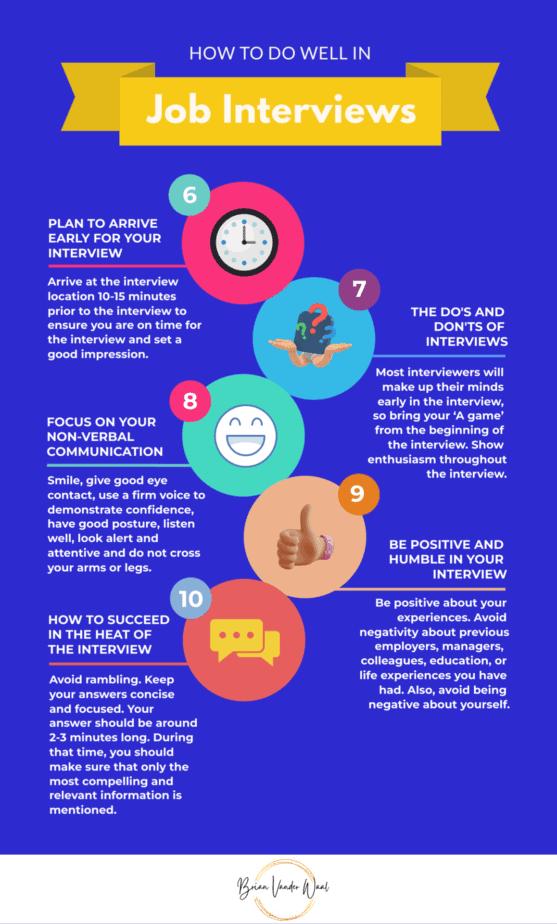
Top Tips on How to Succeed in a Video Interview
94. For a virtual interview, it’s crucial to download the app that will be used (e.g., WhatsApp, Facetime, Skype, Zoom, Microsoft Teams) ahead of time (if you do not already have it) and set up an account if applicable. This preparation will make you feel confident and ready for the interview.
95. Avoid technical difficulties by testing your video conferencing setup beforehand. Ensure a strong internet connection, clear audio and video quality, and familiarity with the platform. Do a practice video call with a friend or family member to iron out any kinks.
96. Before the video interview, plan and set up your shot to ensure you make a good impression. Choose a well-lit space. Natural light, positioned behind your computer, is best. Avoid glare on your face.
97. For video interviews, ensure you have a neutral background that is appropriate and professional. Any pictures, photos, signs, or posters you have in the background should be appropriate and not be offensive. You do not want to lose out on a job opportunity based on an inappropriate background.
98. Sit at an appropriate distance from the camera, ensuring your shoulders and upper body are visible. Ensure you are in the centre of the video, and maintain good posture by sitting up straight.
99. Test the link before the meeting for video interviews and ensure you can access the video call.
100. Prepare your computer and close unnecessary tabs.
101. For video interviews, start logging on 10-15 minutes early in case of a connection delay. You want to arrive on time for a video interview, just like a face-to-face interview. Arriving late will give a wrong impression. Logging in to your video app or session early will also help prevent you from getting stressed and show respect for the interviewers’ time.
102. Dressing professionally for your video interview, just like you would for a face-to-face interview, is essential. Despite being at home, avoid the urge to be casual. Project a polished image that reflects your interest in the position. Remember, video can alter your outfit’s appearance, so do a test run beforehand to ensure you look professional.
103. Be prepared to give a video greeting. You cannot shake hands, but you can ensure you are polite and professional to make an excellent first impression. When you greet the interviewer, smile, nod, and make eye contact with the camera.
104. You need to make good eye contact virtually. Just like in a face-to-face interview, good eye contact matters. You can demonstrate good eye contact in a video interview by looking directly at the camera to simulate eye contact. This conveys attentiveness and engagement.
105. Feel free to speak up if you encounter technical difficulties.
106. Good non-verbal communication and posture (as discussed in my tips above) are equally important in video and face-to-face interviews. Read my tips above to remind you how and why you should demonstrate good non-verbal communication.
107. Give your interviewer time to finish speaking before jumping in with your response. Briefly pause before responding to allow for internet lag.
108. Use visual cues or a concluding statement to indicate you’ve finished your answer. Avoid lengthy pauses that might create awkward silence.
109. If you need to pause to take notes or formulate your thoughts, inform your interviewer to avoid confusion.
110. Always have your camera on during a video interview. Not having your camera on will not set a good impression, as it will show that you lack confidence, are not serious about the interview, and do not respect the interviewing panel.
111. Remember that you are on camera when you are in a video interview and behave in the same way as you would in a face-to-face interview. People sometimes do embarrassing things on camera because they forget they are on camera.
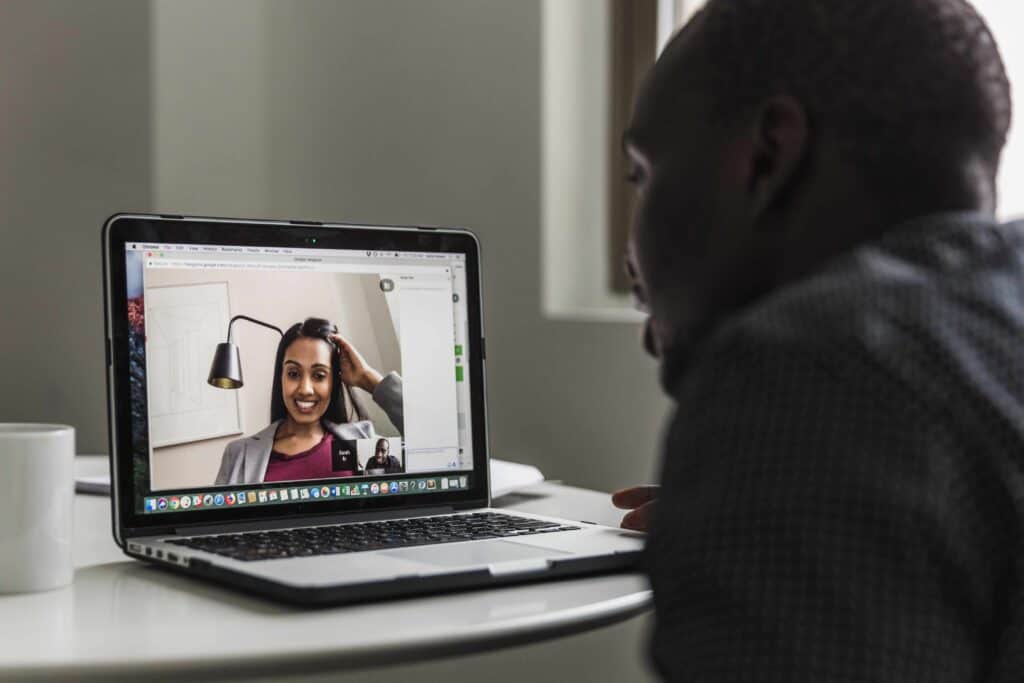
Top Tips on How to Succeed in a Phone Interview
112. Prepare for your phone interview by making notes referencing your qualifications and how they align with the job description. This will assist you in answering interview questions during the interview.
113. Have your resume and portfolio ready for reference during the phone interview.
114. Have a pen and notepad ready. Prepare to jot down important information discussed during the interview for future reference.
115. Conduct a mock interview phone call to practice answering interview questions on the phone. It may feel awkward at first, so it is vital to get used to it.
116. Rehearse your answers aloud, with and without notes, to build confidence.
117. Prepare for phone interviews by fully charging your phone and ensuring a good reception in the location where you will be interviewing.
118. Consider using hands-free headphones so you do not have to hold your phone during the interview. This will help to ensure more consistent sound and clarity throughout the call. You can also access paperwork and documents more efficiently, as you will not hold your phone. Finally, you will likely be more relaxed.
119. Before your phone interview, do a test call to ensure you have a good connection and that your phone and headphones work well.
120. Be available, ensuring your phone isn’t on silent and your phone is in your hand 10-15 minutes before your phone interview.
121. Whilst being an active listener in all interviews is essential, it is especially crucial during phone interviews, as you entirely rely on your hearing. Pay attention, ask questions, and engage with the interviewer to show interest. This will make you feel engaged and interested in the conversation.
122. Even though it’s a phone interview, smiling while speaking conveys enthusiasm. Your smile conveys a positive tone in your voice.
123. Speak clearly and carefully during your phone interview. Take your time answering questions to demonstrate good communication skills and ensure the interviewer understands you.
124. Be professional, courteous, and conversational throughout your phone interview. Maintain a friendly, respectful, professional, and positive tone, avoiding sounding robotic.
125. Even for a phone interview, dress professionally to boost your confidence.
126. Have a friendly and professional voicemail greeting in case you miss the call.
Top Tips for Success at Both Phone and Video Interviews
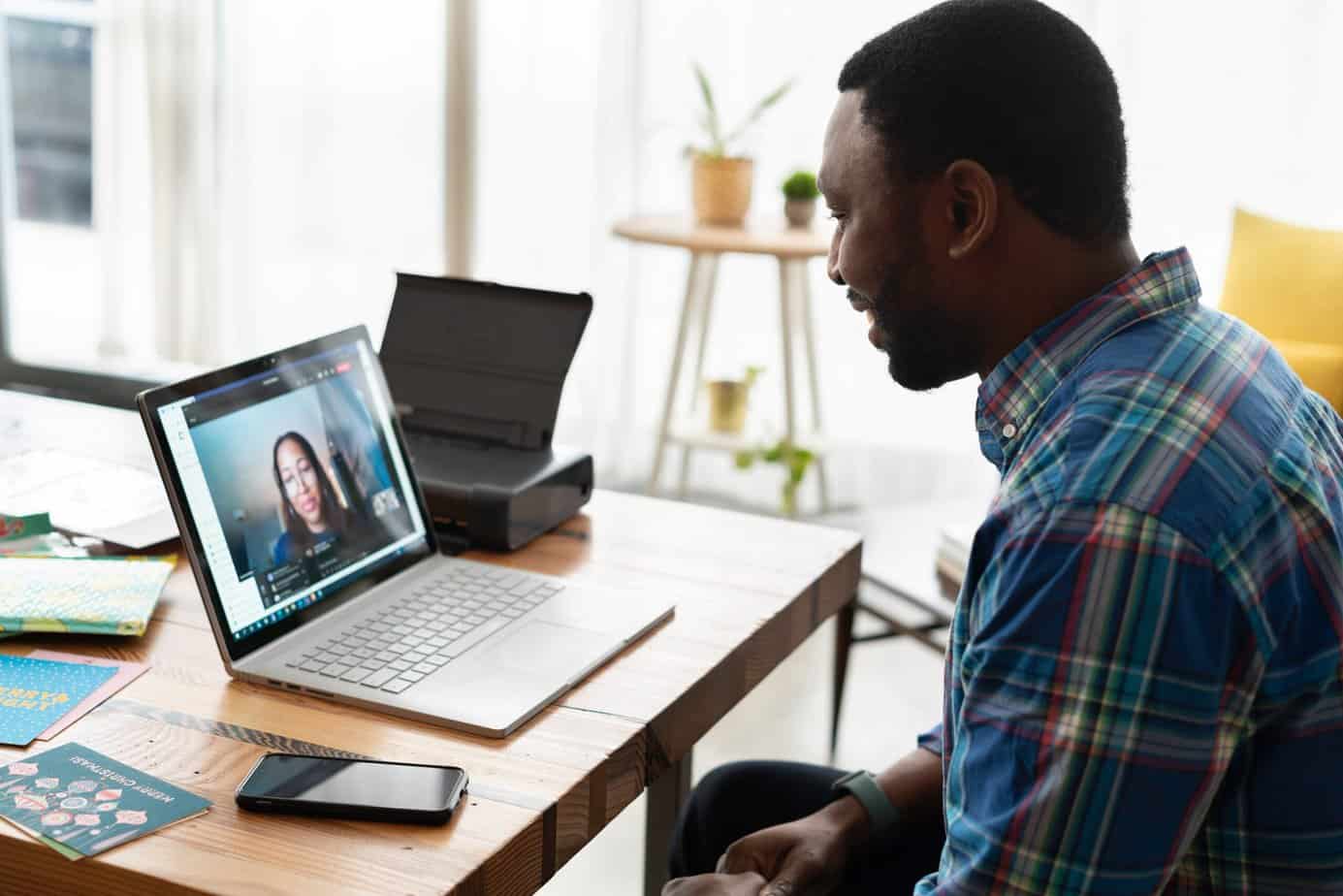
127. Double-check the interview date and time of your phone or video interview beforehand to ensure you’re available for the scheduled interview. Add it to your calendar or set a reminder to ensure you’re ready.
128. Research online to see if the interviewer is a recruiter, hiring manager, or supervisor. This can help you anticipate interview questions.
129. For video and phone interviews, find a quiet space without distractions where you can hear the interviewer. This will help ensure you hear everything they say, their questions, and the information they share.
130. For phone and video interviews, make sure there is no background noise (construction outside, TV, notifications, music, noisy children) in the place where you will be doing the interview. Otherwise, you risk embarrassment, distraction, and awkward moments.
131. Inform others that you will be unavailable during your phone or video interview.
** Review the interview preparation and delivery tips mentioned throughout this article. Most also apply to phone and video interviews, so they will not be repeated here. **
Be prepared to manage tough questions during an interview
132. If the interview question concerns a skill or experience you do not currently have, be honest and tell the interviewer. However, you could explain what you would do in that situation. You could also talk about similar things you have done or transferable skills you have. You could further explain that you are a fast learner and give an example of something you successfully learned to do in a short period without any prior knowledge.
133. If the interview question concerns being made redundant from your previous job, try to stress it was a business decision or the result of COVID-19-related redundancies (if applicable) and describe what positive actions you have taken since that time.
134. If a previous employer fired you due to your performance or conduct, explain what you have learned from this situation and what steps you have taken to develop yourself.
135. If the interview question concerns why you have been out of work for an extended period, honestly explain the situation, but also describe all the positive things you have been doing to develop your knowledge, skills, and experience. Explain that you are eager to return to work and to grow within the company you are applying to.
136. If the interview question asks “Why do you want to leave your current job” or “Why did you leave your last job,” you can explain that you seek to develop in your career, want a fresh challenge, and want to progress. However, you can also explain that you were incredibly grateful for the opportunity and learned a lot.
Use the STAR Method to answer competency-based and behavioral interview questions
137. Competency-based and behavioral questions are used in a high percentage of job interviews because they provide a straightforward way for the interview panel to objectively assess whether the candidate’s experience, skills, and qualities match the job requirements. It also makes it easier for the panel to compare and score candidates.
138. If you want to know whether the interview question is competency-based, the clue is that competency-based interview questions usually start along the lines of “Tell me about a time when.”
139. Many people find behavior-based and competency-based interview questions challenging, but they do not have to be complicated. The best way to answer behavior-based or competency-based interview questions is by using the STAR technique.
140. Using the STAR technique will help you to answer each question in an organized and step-by-step way. It also enables you to provide specific examples and evidence which show that you have the experience and skills needed for the role. It helps you to tell your story.
141. The ‘S’ in the STAR technique stands for ‘Situation.’ You begin your example by explaining the situation you were facing. You give context and background to the situation or set the scene. You might share details regarding the project you were working on, a problem you faced, when it happened, who was involved, and other relevant information. The situation (which relates to the background and context) should not be confused with the task.
142. The ‘T’ in the STAR technique stands for ‘Task.’ The task is your exact role in the situation. You should describe the task you were required to complete. You must explain your task to the interviewers rather than what the other team members did. This is because you are trying to demonstrate your skills rather than theirs.
143. The ‘A’ in the STAR technique stands for ‘Actions.’ Here, you can explain what actions you took in your example. This is the most important part of the STAR technique because it allows you to explain to the interview panel what you did in this situation. You need to talk about your actions, so using ‘I’ rather than “we” is vital so the panel knows what skills you demonstrated through your actions. It is essential to share many details as the interviewers will not know anything about your example. Even if you are interviewing for a promotion and the manager does know about the task and what you did, you still must explain your actions in detail to score higher. It is crucial to explain how and why you took the actions you decided to take.
144. The ‘R’ in the STAR technique stands for ‘Result.’ You need to explain the positive result of your work and what you achieved. Your result should usually be quantifiable. For example, increased sales or profits, efficiency savings, repeat business, and more. However, it could be something like a satisfied customer, which is less quantifiable but still is a clear result, especially if the customer gave feedback.
145. You can demonstrate to the interviewing manager that you are a reflective professional if you explain what you learned from a specific work project or situation and what you would do differently the next time. Your interviewer will be impressed because this is a skill and practice that managers want their staff to have.
146. When preparing for interviews using the STAR technique, you should list the skills and experiences required for the job, as stated in the job description. Then, think about specific examples of times you displayed those skills, writing down the situation, task, action, and result in each instance. Writing it down will help you to make sure you structure your answer using the STAR technique and commit your answer to memory. You can then read and review your answers in the run-up to the interview.
147. During your interview prep, practice common competency-based interview questions and try answering each of them using the STAR technique.
148. Be specific when sharing your example when answering a question using the STAR technique. Sharing generalized actions such as ‘I supported the customer’ or results such as ‘the customer was happy’ will not impress your interviewer as they do not evidence the skills you demonstrated and are not measurable. The best answers will give specific actions you took or quantifiable results to evidence to the hiring manager that your actions had an impact.
149. When you answer behavioral and competency-based interview questions, make sure your examples and answers are relevant to the questions. For instance, if the question is about problem-solving, make sure that you give an example of a time that you found a creative solution to solving a problem.

What to do at the end of the interview and after the interview
150. At the end of the interview, express your strong interest in and excitement for the role.
151. At the interview’s close, ask the recruiting manager about the next steps, ensuring you know what to expect, are prepared for upcoming interview stages, and show your initiative and interest in the role.
152. As you leave the interview, thank the interview panel for their time, smile and shake each member of the panel’s hand (if it feels appropriate culturally or in a post-COVID world). You can usually get signals regarding whether the interviewers feel comfortable with shaking hands, or you can follow their lead.
153. After the interview, always send each interviewer a personal thank you note within 24 hours, thanking them for their time and the opportunity to interview for their job and company. You can send a thank you note via letter or email. Personalizing your notes by referring to what you discussed with them is a good idea. In the thank you note, you should:
- Reiterate your strong interest in the role,
- Include any details you may have forgotten to mention during your interview,
- Summarize what you want the panel to remember about you and why you are a good fit for the position.
154. If you do not have the contact details of those interviewing you, you can ask the interviewers for their business cards. Alternatively, ask the receptionist for the interviewers’ contact details so you can send a follow-up note.
155. Finally, always ask for feedback on your interview after the interview (even if you were successful). Use the feedback given to help you improve for an interview you may have in the future.
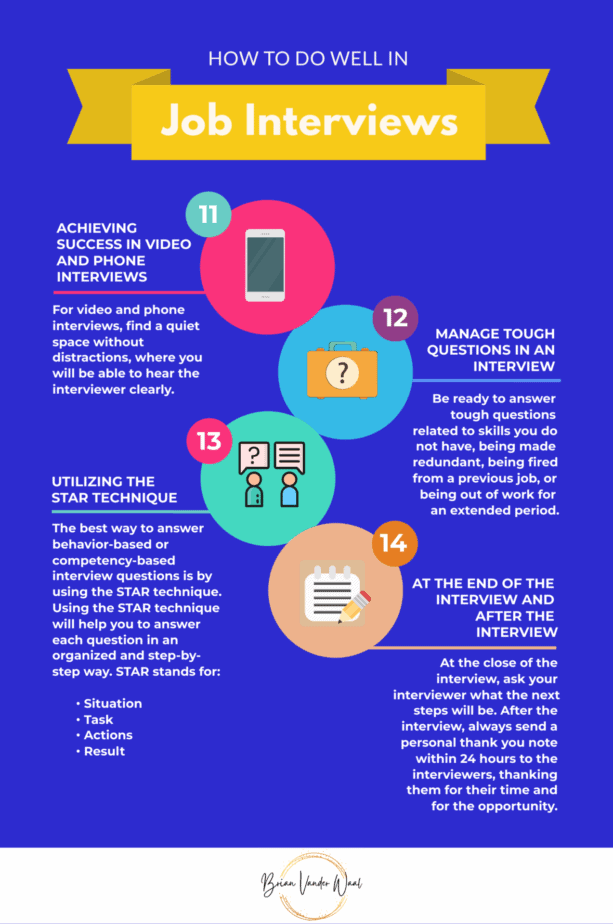
What to Do When Receiving a Job Offer After Your Final Interview
156. Take the time to carefully review the offer before making any decisions. Consider factors such as salary, benefits, work hours, company culture, and potential for growth within the company.
157. If any parts of the offer are unclear, don’t hesitate to ask for clarification. This includes details about the job responsibilities, salary structure, and any additional perks or benefits.
158. If you feel that the initial offer does not meet your expectations or if you have received other job offers that are more attractive, consider negotiating with the employer. Be professional and respectful in your approach, and state your reasons for requesting a higher salary or additional benefits.
159. Consider how this job offer fits your long-term career goals and aspirations. Reflect on your potential for growth and advancement within the company and how this job aligns with your values and interests.
160. If you are unsure whether to accept the job offer, consider seeking advice from mentors, Career Coaches, or trusted friends or family members. They may be able to provide valuable insights to help you make an informed decision.
161. Once you have carefully considered all aspects of the job offer and decided, respond to the employer promptly. If you accept the offer, express your gratitude and enthusiasm for the opportunity. If you are declining the offer, be respectful and explain your decision briefly.
Conclusion: Interview Tips – How to Excel in a Job Interview
Mastering the art of interviewing is about preparation and strategy. By following the comprehensive guide outlined in “161 Job Interview Tips 2026: How to Excel in An Interview,” you will equip yourself with invaluable tools to navigate the interview process with confidence and finesse.
So, as you prepare for your next interview, I urge you to put these tips into practice. Be proactive, be diligent, and above all, be yourself. If you follow these interview best practices I taught you, you can succeed in your next interview.
Now, it’s time to implement these tips. Your dream job awaits—go out there and make it yours!
I wish you the best of luck with your interview. I am sure you will be great, and I would love to hear from you after your interview!
If you would like to learn more about careers of the future, read my top picks for the best future careers.
Sources:
Frequently Asked Questions (FAQs) – Interview Tips 2026: How to Excel in An Interview
What are some tips that will help me prepare for a job interview?
Some tips for preparing for an interview include researching the company, practising your answers to common questions, dressing professionally, and arriving on time. My blog above offers many more tips on how to prepare for an interview.
How can I keep the interview conversation flowing smoothly?
To keep the interview conversation flowing smoothly, make sure to listen carefully to the questions, answer them clearly and concisely, and ask thoughtful questions of your own.
Why is it important to be familiar with the job requirements listed in the job description?
It is important to be familiar with the job requirements listed in the job description so that you can tailor your answers to show how your skills and experience align with what the employer is looking for.
What are some best interview tips for job seekers?
Some best interview tips for job seekers include practising your interview answers, researching the company and role, preparing questions to ask the interviewing manager, and following up with a thank-you note after the interview.
What should I do if I am unsure about how to answer an interview question?
If you are unsure about how to answer an interview question, take a moment to gather your thoughts, ask for clarification if needed, and then provide a thoughtful response based on your experience and skills.
What are some great questions to ask during an interview?
Some great questions to ask during an interview include questions about the company culture, questions about the next steps in the hiring process, and clarification on the job responsibilities and expectations.
What questions should I ask to demonstrate a genuine interest in the opportunity?
Ask questions that reflect your understanding of the role and the company. Inquire about the company’s core values, potential growth opportunities, and details about the day-to-day responsibilities of the job you’re interviewing for. Avoid asking questions for the sake of asking; focus on genuine questions that show you want to be involved.
How can I show that I excel in job interviews during the recruitment process?
To excel in job interviews, be punctual, present yourself well, and express genuine interest in the opportunity. Prepare to ask questions about the role and the company’s values, showing you’ve done your research and are truly interested in being part of their team. My blog above has many more tips.
How can I manage nervousness during an interview to give a good impression?
Try to relax before the interview by practising mindfulness or deep breathing exercises. Feel prepared by researching common interview questions and rehearsing your answers. Remember, it’s normal to feel nervous, but showing that you can handle your nervousness can demonstrate your ability to manage stress effectively.
Is being early to an interview as important as people say?
Yes, being punctual is crucial. It demonstrates your respect for the recruiting manager’s time and your genuine interest in the opportunity. Aim to arrive 10-15 minutes early to allow yourself time to relax and review your notes, ensuring you enter the interview room calmly and prepared.
How can I demonstrate my suitability for the role I am interviewing for?
Highlight specific experiences and skills that align with the job description and the company’s core values. Be ready to provide examples that show you have the qualities of an ideal candidate. Show enthusiasm for the role and explain why your personal and professional goals align with the company’s objectives.
